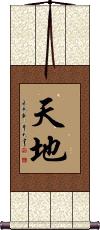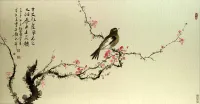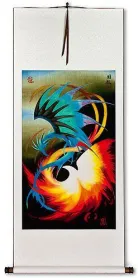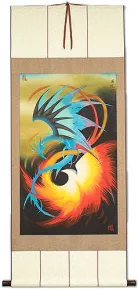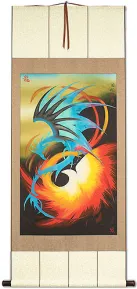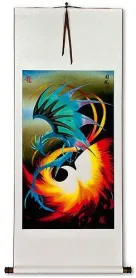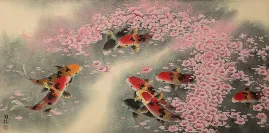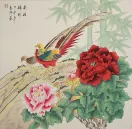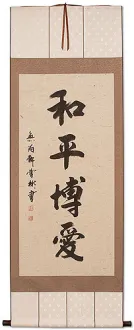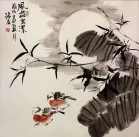Many custom options...
And formats...

Heaven and Earth in Chinese / Japanese...
Buy a Heaven and Earth calligraphy wall scroll here!
Heaven and Earth
天地 is “Heaven and Earth” in Chinese, Japanese Kanji, and old Korean Hanja.
This title is used in many different contexts. It can be a general term but is also used by Buddhists and in other religions.
This can also be used to refer to all of nature, the universe, the top and bottom, the realm of life, or the sphere of existence.
This in-stock artwork might be what you are looking for, and ships right away...
Gallery Price: $322.00
Your Price: $178.88
Chinese Golden Pheasant and Flower Painting
Discounted Blemished
Gallery Price: $63.00
Your Price: $35.00
Gallery Price: $265.00
Your Price: $99.88
Not the results for Heaven and Earth that you were looking for?
Below are some entries from our dictionary that may match your Heaven and Earth search...
| Characters If shown, 2nd row is Simp. Chinese |
Pronunciation Romanization |
Simple Dictionary Definition |
四大 see styles |
sì dà si4 da4 ssu ta shidai しだい |
More info & calligraphy: Shidai / Sida / Mahabhuta(1) {Buddh} the four elements (earth, water, fire, wind); (2) the human body; (3) Tao, heaven, earth and king mahābhūta, 四界; 四大界. The four elements of which all things are made; or the four realms; i. e. earth, water, fire, and wind (or air); they represent 堅, 濕, 煖, and 動 solid, liquid, heat, and motion; motion produces and maintains life. As 實 active or formative forces they are styled 四界 (四大界) ; as 假 passive or material objects they are 四大; but the 成實論 Satyasiddhi śāstra disputes the 實 and recognizes only the 假. |
天地 see styles |
tiān dì tian1 di4 t`ien ti tien ti tenchi(p); ametsuchi てんち(P); あめつち |
More info & calligraphy: Heaven and Earth(1) heaven and earth; the universe; the world; nature; (2) (てんち only) land; world; realm; sphere; (3) (てんち only) top and bottom; (4) (あめつち only) gods of heaven and earth; (surname) Amachi heaven and earth |
神明 see styles |
shén míng shen2 ming2 shen ming shinmei / shinme しんめい |
More info & calligraphy: Deities / Gods(1) deity; god; (2) (See 天照大神) Amaterasu (as an enshrined deity); (surname) Jinmei The spirits of heaven and earth, the gods; also the intelligent or spiritual nature. |
釋迦牟尼 释迦牟尼 see styles |
shì jiā móu ní shi4 jia1 mou2 ni2 shih chia mou ni Shakamuni |
More info & calligraphy: Shakyamuni / The Buddha釋迦文 (釋迦文尼); 釋伽文 Śākyamuni, the saint of the Śākya tribe. muni is saint, holy man, sage, ascetic monk; it is: intp. as 仁 benevolent, charitable, kind, also as 寂默 one who dwells in seclusion. After '500 or 550' previous incarnations, Śākyamuni finally attained to the state of Bodhisattva, was born in the Tuṣita heaven, and descended as a white elephant, through her right side, into the womb of the immaculate Māyā, the purest woman on earth; this was on the 8th day of the 4th month; next year on the 8th day of the 2nd month he was born from her right side painlessly as she stood under a tree in the Lumbinī garden. For the subsequent miraculous events v. Eitel. also the 神通遊戲經 (Lalitavistara), the 釋迦如來成道記, etc. Simpler statements say that he was born the son of Śuddhodana, of the kṣatriya caste, ruler of Kapilavastu, and Māyā his wife; that Māyā died seven days later, leaving him to be brought up by her sister Prājapati; that in due course he was married to Yaśodharā who bore him a son, Rāhula; that in search of truth he left home, became an ascetic, severely disciplined himself, and finally at 35 years of age, under a tree, realized that the way of release from the chain of rebirth and death lay not in asceticism but in moral purity; this he explained first in his four dogmas, v. 四諦 and eightfold noble way 八正道, later amplified and developed in many sermons. He founded his community on the basis of poverty, chastity, and insight or meditation, ad it became known as Buddhism, as he became known as Buddha, the enlightened. His death was probably in or near 487 B.C., a few years before that of Confucius in 479. The sacerdotal name of his family is Gautama, said to be the original name of the whole clan, Śākya being that of his branch, v. 瞿, 喬.; his personal name was Siddhārtha, or Sarvārthasiddha, v. 悉. |
一體 一体 see styles |
yī tǐ yi1 ti3 i t`i i ti ittai |
an integral whole; all concerned; everybody Though externally differing, in nature the same; the fundamental unity of the universe. 天地與我同根, 萬物與我一體 Heaven, earth, and myself have the same root; all things are one corpus with me. |
三元 see styles |
sān yuán san1 yuan2 san yüan sangen さんげん |
(old) first place in civil service examinations at three levels: provincial 解元[jie4 yuan2], metropolitan 會元|会元[hui4 yuan2] and palace 狀元|状元[zhuang4 yuan2] (1) (See 上元,中元・1,下元) 15th day of the 1st, 7th and 10th lunar months; (2) heaven, earth and man; (3) January 1; New Year's Day; (can act as adjective) (4) {chem} ternary; (female given name) Miyuki |
三才 see styles |
sansai さんさい |
(1) (form) the three powers (heaven, earth and man); (2) (form) everything in the universe; (surname) Sanzai |
三界 see styles |
sān jiè san1 jie4 san chieh sangai さんがい |
(1) {Buddh} (See 欲界,色界,無色界) the three realms of existence; (2) (abbreviation) {Buddh} (See 三千大千世界) the whole universe (of a billion worlds) that Buddha enlightened; (3) {Buddh} (See 三世・さんぜ・1) past, present and future existences; (suffix) (4) far-off ...; distant ...; (surname) Mikai Trailokya or Triloka; the three realms; also 三有. It is the Buddhist metaphysical equivalent for the Brahmanic cosmological bhuvanatraya, or triple world of bhūr, bhuvaḥ, and svar, earth, atmosphere, and heaven. The Buddhist three are 欲, 色, and 無色界, i.e. world of sensuous desire, form, and formless world of pure spirit. (a) 欲界 Kāmadhātu is the realm of sensuous desire, of 婬 and 食 sex and food; it includes the six heavens of desire, the human world, and the hells. (b) 色界 Rūpadhātu is the realm of form, meaning 質礙 that which is substantial and resistant: it is above the lust-world and contains (so to speak) bodies, palaces, things, all mystic and wonderful一a semi-material conception like that in Revelation; it is represented in the 四禪天, or Brahmalokas. (c) 無色界 Arūpadhātu, or ārūpyadhātu, is the formless realm of pure spirit, where there are no bodies, places, things, at any rate none to which human terms would apply, but where the mind dwells in mystic contemplation; its extent is indefinable, but it is, conceived of in four stages, i,e. 四空處 the four "empty" regions, or regions of space in the immaterial world, which are 四無色 the four "formless" realms, or realms beyond form; being above the realm of form, their bounds cannot be defined. v. 倶舍論世間品. |
乾坤 see styles |
qián kūn qian2 kun1 ch`ien k`un chien kun kenkon けんこん |
yin and yang; heaven and earth; the universe heaven and earth; universe |
人天 see styles |
rén tiān ren2 tian1 jen t`ien jen tien ninden; jinten; ninten にんでん; じんてん; にんてん |
{Buddh} earth and heaven; human and heavenly beings Men and devas. |
兩儀 两仪 see styles |
liǎng yí liang3 yi2 liang i |
heaven and earth; yin and yang |
六天 see styles |
liù tiān liu4 tian1 liu t`ien liu tien rokuten ろくてん |
(place-name) Rokuten The six devalokas, i. e. the heavens with sense organs above Sumeru, between the brahmalokas and the earth, i. e. 四王天; 忉利天; 夜摩天; 兜率天; 樂變化天; and 他化自在天. The sixth is the heaven of Mara, v. 六欲天. |
四知 see styles |
sì zhī si4 zhi1 ssu chih shichi |
The four who know the workings of one's mind for good or evil— heaven, earth, one's intimates, and oneself. |
天堂 see styles |
tiān táng tian1 tang2 t`ien t`ang tien tang tendou / tendo てんどう |
paradise; heaven heaven; paradise; (surname) Tendou The mansions of the devas, located between the earth and the Brahmalokas; the heavenly halls; heaven. The Ganges is spoken of as 天堂來者 coming from the heavenly mansions. |
天壌 see styles |
tenjou / tenjo てんじょう |
heaven and earth |
天変 see styles |
tenpen てんぺん |
natural calamity; striking phenomena in heaven and earth |
天宮 天宫 see styles |
tiān gōng tian1 gong1 t`ien kung tien kung tiangon; tenkyuu / tiangon; tenkyu ティアンゴン; てんきゅう |
Temple in Heaven (e.g. of the Jade Emperor); Tiangong, Chinese space station program Tiangong (Chinese space program); (surname) Amemiya devapura; devaloka; the palace of devas, the abode of the gods, i. e. the six celestial worlds situated above the Meru, between the earth and the Brahmalokas. v. 六天. |
天遍 see styles |
tenpen てんぺん |
natural calamity; striking phenomena in heaven and earth |
天道 see styles |
tiān dào tian1 dao4 t`ien tao tien tao tentou; tendou / tento; tendo てんとう; てんどう |
natural law; heavenly law; weather (dialect) (1) (てんとう only) the sun; (2) god of heaven and the earth; (3) laws governing the heavens; (4) {astron} celestial path; celestial motion; (5) {Buddh} (See 六道) deva realm (svarga); (surname, given name) Tendō deva-gati, or devasopāna, 天趣. (1) The highest of the six paths 六道, the realm of devas, i. e. the eighteen heavens of form and four of formlessness. A place of enjoyment, where the meritorious enjoy the fruits of good karma, but not a place of progress toward bodhisattva perfection. (2) The Dao of Heaven, natural law, cosmic energy; according to the Daoists, the origin and law of all things. |
封禪 封禅 see styles |
fēng shàn feng1 shan4 feng shan |
(of an emperor) to pay homage to Heaven at Mount Tai and to Earth at Mount Liangfu |
拜堂 see styles |
bài táng bai4 tang2 pai t`ang pai tang |
ritual kneeling to heaven and earth by bride and groom in a old-fashioned wedding ceremony; same as 拜天地 |
玄黄 see styles |
genkou / genko げんこう |
(rare) black and yellow silk (offered to gods); heaven and earth |
盤古 盘古 see styles |
pán gǔ pan2 gu3 p`an ku pan ku banko ばんこ |
Pangu (creator of the universe in Chinese mythology) Pangu; creator of heaven and earth in Chinese mythology |
盤固 see styles |
banko ばんこ |
Pangu; creator of heaven and earth in Chinese mythology |
神祇 see styles |
shén qí shen2 qi2 shen ch`i shen chi jingi じんぎ |
god; deity gods of heaven and earth |
郊祀 see styles |
jiāo sì jiao1 si4 chiao ssu |
pair of annual sacrificial ceremonies held by the emperor in ancient times: one in the southern suburbs of the capital (bringing offerings to Heaven) and another in the northern suburbs (with offerings to Earth) |
霄壌 see styles |
shoujou / shojo しょうじょう |
heaven and earth |
霄壤 see styles |
xiāo rǎng xiao1 rang3 hsiao jang shōjō |
heaven and earth |
五種天 五种天 see styles |
wǔ zhǒng tiān wu3 zhong3 tian1 wu chung t`ien wu chung tien goshu ten |
(1) 名天 famous rulers on earth styled 天王, 天子; (2) 生天 the highest incarnations of the six paths; (3) 淨天 the pure, or the saints, from śrāvakas to pratyekabuddhas, and (4) 義天 all bodhisattvas above the ten stages 十住, and (5) 第一義天 a supreme heaven with bodhisattvas and Buddhas in eternal immutability; 涅槃經 23. Cf. 天宮. |
五輪塔 see styles |
gorintou / gorinto ごりんとう |
five-part gravestone representing earth, water, fire, wind and heaven; (place-name) Gorintou |
Click here for more Heaven and Earth results from our dictionary
The following table may be helpful for those studying Chinese or Japanese...
| Title | Characters | Romaji (Romanized Japanese) | Various forms of Romanized Chinese | |
| Heaven and Earth | 天地 | tenchi | tiān dì / tian1 di4 / tian di / tiandi | t`ien ti / tienti / tien ti |
Successful Chinese Character and Japanese Kanji calligraphy searches within the last few hours...
